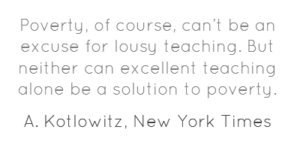There are two main ways that poverty and education seem to interact.
The first way that poverty and education interacts is in the belief that poverty is a major inhibitor to a good education. In my previous post I outlined three reasons why I don’t think that this is always the case.
The second way that poverty and education interact is in the belief that the education system is the best tool we have as a society to solve the issues relating to poverty.
In a New York Times Article written in September this year the author makes the following statement.
“Are we expecting too much of our teachers? Schools are clearly a critical piece — no, the critical piece — in any anti-poverty strategy”
Every teacher would agree, the responsibility of educating the next generation is no small task, and for the majority of teachers one that is taken with a due sense of diligence.
But do we really have to wear the responsibility of fixing all of society’s problems? As teachers do we need to solve the problem between poverty and education?
There has been no shortage of talk and action when it comes to poverty and education.
In the last decade or so we have had the:
- Make poverty history campaign
- No child left behind strategy
- Two trillion a year spent by governments on education globally
- In the U.S a 270% increase in expenditure on education in real terms under the last two presidential administrations
- [You could add your own local statistic here]
Yet poverty rates are rising!
Nelson Mandela stated that “Education is the most powerful weapon which you can use to change the world.”
I believe that to be true, but I think we might be putting the cart before the horse.
Many people who make these statements seem to think that you can fix what is wrong with education by fixing the issue with poverty. In believing this we set off to solve the poverty issue, generally by throwing more money at it.
What would happen if we didn’t try and solve poverty?
That is a radical thought I know! I wonder what would happen if instead of placing the demand on educators to fix problems, we just allowed teachers to teach.
I wonder what would happen if we were simply left to do the job of teaching our students to ask critical questions, creatively solve problems and analyse and apply information.
Would these students be able to see answers that we can’t see?
In the short to medium term, poverty would still exist. There would still be inequality. Education and poverty would still continue to collide. But given a generation, maybe, just maybe things would begin to change. Not because we had forced change, but rather because we had created an environment in which change was able to take place.
What are your thoughts?











